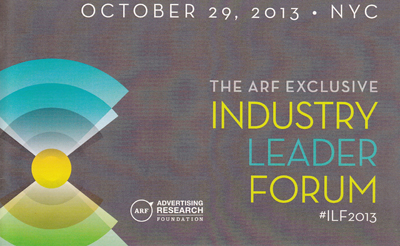A single measurement tool to gauge effectiveness of integrated multi-screen marketing campaigns is the Holy Grail of the marketing mix modeling advocates who attended today’s Advertising Research Foundation Industry Leader Forum in New York at the Time and Life Building.
 Gayle Fuguitt, who retired after 30 years at General Mills and recently moved from Minneapolis to New York to helm the ARF, talked about challenges created by the changing media and consumer landscape
Gayle Fuguitt, who retired after 30 years at General Mills and recently moved from Minneapolis to New York to helm the ARF, talked about challenges created by the changing media and consumer landscape
She noted the dramatic surge in interest in MMM, which uses statistical analysis of sales/marketing data at various time points to estimate impact of tactics on sales performance and future outcomes.
That dramatic growth is tied to the Big Data boom and development of mobile, social media and cross-platform marketing.
Assn. of National Advertisers CEO Bob Liodice issued a “call to action,” urging marketers, media pros and researchers to work together to develop a standard measurement tool.
He faulted the industry for engaging in “too much talk” and little action. In his view, there’s a need to share what works and what doesn’t with the industry in order to develop scientific-based benchmarks.
Liodice released results of a survey by ANA and Nielsen of 276 marketers, agency and media buyers.
Forty-eight percent of respondents consider multi-screen campaigns a very important part of their marketing arsenal, accounting for about 20 percent of spending.
In three years, they project those numbers would rise to 88 percent and 50 percent, respectively.
ANA will soon publish a white paper on the study.
Human behavior is biggest input
Panelists agreed that a “holistic” approach to MMM is vital, saying judgments are about more than doing things because of data and numbers.
Patrick McGraw, director of consumer & market knowledge at Procter & Gamble, said researchers must to move beyond measuring media and advertising to take into account the “total business perspective.”
Chuck McLeish, senior director of marketing planning and services at Lego Systems, described marketing as an art and science.
When considering MMM, McLeish factors in the competitive environment along with basic intuition to put things in context and balance.
He said Lego’s marketing team is encouraged to ignore research results if the data doesn’t just feel right.
McLeish learned a valuable lesson earlier in his career at Kraft Foods, when a mentor warned, “If you ever say, the model says…. You’re fired!”
Fuguitt, who moderated the session, asked what percentage of decisions are machine vs. human-based.
John Walthour, director of global insights at General Mills, spoke for the panel when he said: “Models don’t make decisions. People do.”
It’s a sure bet things will be a different story five years ago as new techniques emerge.
Brad Smallwood, head of measurement and pricing at Facebook, noted that today’s consumer did not exist five years ago.
He said many MMM programs are based on “old experiences.”
Who knows what the future will bring?
Zeno Group promoted the forum.



 Have a comment? Send it to
Have a comment? Send it to 
No comments have been submitted for this story yet.